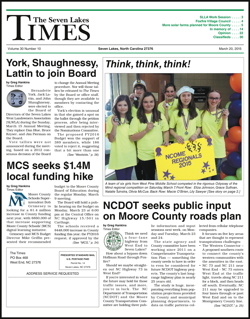 Robbins remains the Moore County Board of Commissioners' preferred long-term source for bringing more water to the expanding customer base served by Moore County Public Utilities.
Robbins remains the Moore County Board of Commissioners' preferred long-term source for bringing more water to the expanding customer base served by Moore County Public Utilities.
During a Tuesday, March 3 special meeting, a majority of the Board agreed that a long-term water solution is needed -- and the most likely source for that would be from the Town of Robbins.
Public Works Director Randy Gould presented the Board with options to meet both ten year and thirty-year demand projections, explaining that the County will need an additional one million gallons per day in ten years to meet peak demand, and two million gallons per day on top of that to meet the projected demand in thirty years.
The three primary short-term strategies include: tapping Robbins' reservoir on Bear Creek, drilling more wells, or buying more water from Harnett County -- already an important source of purchased water for the County. Longer term, Gould presented two options: tapping the Deep River near Robbins, or drilling more than twenty new wells in the Pinehurst area.
Short Term: More Wells, or Purchased Water?
In the short term, the quickest and cheapest options are drilling more wells or bringing more water from Harnett County to a pump station on NC Highway 73 -- which would supply the Seven Lakes area.
Gould pegged the cost of seven new wells and related infrastructure at $5.1 million. Bringing more water from Harnett County will require $1.5 million in infrastructure upgrades. By contrast, tapping into Robbins' Bear Creek reservoir is expected to cost nearly $15 million.
The cost differential seemed to persuade Commissioner Tim Lea that wells and-or Harnett County water might be the best short-term option.
“There’s absolutely no way I am going to indebt the rate payer in this County at a cost of three times what it would cost to go and buy a million gallons a day,” said Lea.
However, Chairman Larry Caddell expressed doubts about relying on more wells for the County’s water needs.
“One of the things we talked about all along is being diverse," Caddell said. "My problem with all the wells is if you put all your eggs in one basket. It’s cheaper, it would be cheaper on the people, but is it the smartest thing to do?”
“Sometimes the cheapest option ain’t the best way to go,” said Chairman Caddell. “I am looking for a long-term solution -- not the cheapest.”
Commissioner Nick Picerno agreed: “My vision -- and I have said it from day one -- we need multiple sources of water.”
Gould explained that user rates would increase from $7 to $12 per month to pay for any combination of the three projects presented. The current average water and sewer bill (for customers who have sewer) is $53.51 per month, Gould said.
Buying More Water from Harnett
Under current agreements, the County can simply purchase up to one million gallons per day in additional water from Harnett County, though using that water will require some upgrades to the County's system. The extra water could be pumped to a booster pump station on NC Highway 73 to service the Seven Lakes area, Gould explained.
Currently, almost all of Seven Lakes' water is delivered through a water main that runs along NC Highway 211 from Pinehurst, passing through a booster station near West Pine Middle School. A new NC Highway 73 line would bring water to Seven Lakes from two directions.
“All the developments that we think are going to take place are between Seven Lakes and Pinehurst,” Gould said, explaining the rationale for supplying additional capacity in that section of the County.
The idea of using Harnett County water as the short-term solution seemed to appeal to Commissioners Jimmy Melton, Craig Kennedy, and Tim Lea.
Robbins in the long term
Longer term, the Commissioners appeared to favor working out a water deal with Robbins, since it would provide an in-County source for water -- and could fuel economic growth in northern Moore County. According to Gould, it would likely take five years to get the Robbins options up and running, at a ten-year cost of nearly $15 million. The thirty-year project of adding a water intake on the Deep River would add another $15 million to the total cost.
“Any investments we make in the northern end of the County, I think we will see growth -- be it businesses, be it residential developments popping up,” said Commissioner Kennedy, “So you need to weigh that in the factor. So you spend money, but you’re going to increase property values, increase investment and capital in the County, so those factors have to weigh in also.”
Picerno asked the Board to not be “short sighted” when looking at a possible deal with Robbins.
“Robbins needs some help and they are in Moore County,” said Picerno, “If some of this is developed, how will that affect the total economics of Moore County?”
“If you want the water, none of these options are going to be free,” explained Picerno, “What we need to do -- hopefully as a Board -- is take the time to explore further with Robbins how we might integrate their system into our system -- how we may come up with some creative ways to pay for it in a different way.”
The Board made no formal decision during Tuesday's special meeting, but did express the intention to continue to try to move forward talks with Robbins on how the County and Town can co-operate on water issues.
